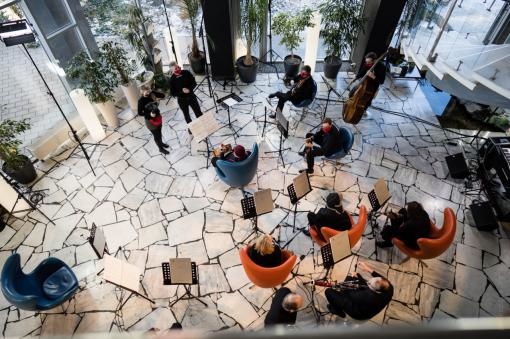While concert halls and opera houses are rather on the empty side, seven hotels in the city have seen a lot more activity thanks to the Brno Contemporary Orchestra – a chamber music group led by Pavel Šnajdr and the arts platform Terén – Pole performativního umění (Terrain – Fields for the Performing Arts). Every night of the week, from 15 to 21 March, fans of modern artificial music had the opportunity to visit one of the hotels via YouTube. Not only was the atmosphere of the empty rooms and corridors absorbing, but also the drama in combination with unusual the visual stimuli. Please, do not disturb, as the series was named by its creators - the Brno Contemporary Orchestra and Terén, featured more than just standard recordings of concerts. Indeed, a narrative thread ran through every evening’s experience, which was directly or subtly connected with the musicians or the space itself.
The opening concert entitled Fantom Hotelu Continental (The Phantom of the Continental Hotel) was dedicated to the legacy of the composer Zbyněk Vostřák, whose Kyvadlo času (The Pendulum of Time, 1967) was accentuated through the direction of Anna Babjárová, who evoked a mysterious and precarious atmosphere, with the cellist Josef Klíč exploring the corridors and rooms of the empty hotel, as if a ghost trapped in the past and within the walls of the Continental Hotel. The Pendulum of Time is a piece that encompasses elements of contemporary classical music and original motifs that harken back to earlier traditions. Vostřák does not devote himself to modernity in an obvious manner and for its own sake. The part in which a gentle melody on the flute follows on from the rougher tones of the flute says much about the author’s sense of internal tension and his ability to combine the contemporary with echoes of more traditional music. The “grotesque” planes enhanced by the director’s surrealistic interpretation are also impressive, as is the manner of the performance. It is also necessary to highlight the supreme playing of the cellist, Josef Klíč.
Rytmus velkoměsta (The Rhythm of the City), the second concert in the series, showed musicians seated in the restaurant garden of the Grandhotel Brno, where they performed Martin Burlas’ Amnesia (2012). Martin Svobodník took on the role of director, screenwriter and camera operator. The loud, succinct, strictly rhythmical, clamorous and sometimes even cacophonous (in a good way!) Amnesia forced the artist to go out and about with the video – amidst people, tramways and buildings. The hotel became a mere backdrop, instead the city became the focus of the event. A likely inspiration was the cinematic visionary Dziga Vertov, most notably his masterpiece Muž s kino aparátem (Man with a Movie Camera) (as interpreted by the composer Michael Nyman). Although Burlat’s short film, at just five and a half minutes, does not offer much visual variation (partly due to its inherent minimalism), Svobodník still created an audio-visual montage of merit. The production of the music was suitably abrasive and uncompromising, with plaudits going to the exemplary brass section and the slow glissandos of the strings, undercutting the rhythmical interjections of the trombones, French horns and percussion, reminiscent of distant sirens over the ever-present ambient noise of the city streets.
The bright spaces of the glass atrium of the Barceló Hotel became the venue for the third evening. The concert entitled Paralelní světy (Parallel Worlds) presented a composition by Michal Wróblewski Herzmerz (2019), directed again by Anna Babjárová, with cellist Katarína Madariová as the star. The visuals had moved on, becoming more imaginative and some camera angles were quite striking. A memorable moment involved a disturbing shadowy corridor, with the camera tracking backwards from narrow framing of Katarina Madariová at the end. The work itself lent space to individual instruments, and some aspects took on an almost dialogue-like quality. The entrance of soloist Lukáš Miko – predatory, powerful, relentless and, most importantly, urgent – was a real highlight. Soon afterwards, the flute of Michal Vojáček somewhat softened proceedings. This nicely illustrates the contrasting dynamics of Herzmerz as a composition – on the one hand, coarse and aggressive, on the other, mysteriously lyrical and cathartic.
Láska z paláce (Love from the Palace; referring to Padowetz Palace Hotel Brno) under the direction of Sára Sliwková was definitely one of the greatest surprises of the Please, do not disturb series. The melodic, salon-like and playful arias of Leo Fall’s operettas were clearly evident under her direction, despite the modern edge lent by Mario Buzzi. However, I do not think any the less of it in any way. The director transformed the concert into a welcoming, joyful form of entertainment, which invited the audience in to the dancers’ circle, breaking down the barriers of being a mere spectator and making them part of the ensemble. The natural, comprehensible, bright, kind and emotional expression of the baritone Tomáš Krejča lifted this meeting of musical minds to a higher level of chamber performance.
While online concerts performing modern artificial music are often (quite rightly) looked down upon, the Brno Contemporary Orchestra has shown that even under challenging circumstances in the wider world, interesting and unique performance is possible to transcend the mundane. The opportunity to elude the snares currently affecting concerts and culture may still be some way off, so perhaps there’s nothing else for it but to hope that similarly inventive projects are forthcoming on a much larger scale.
































No comment added yet..